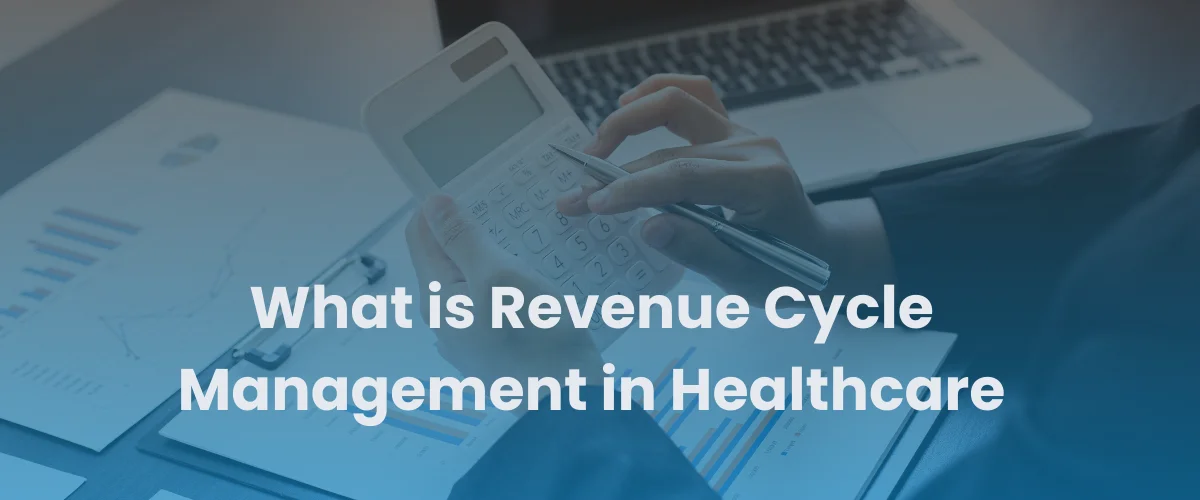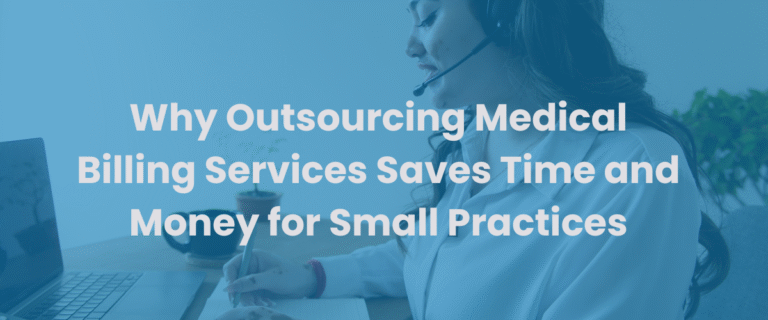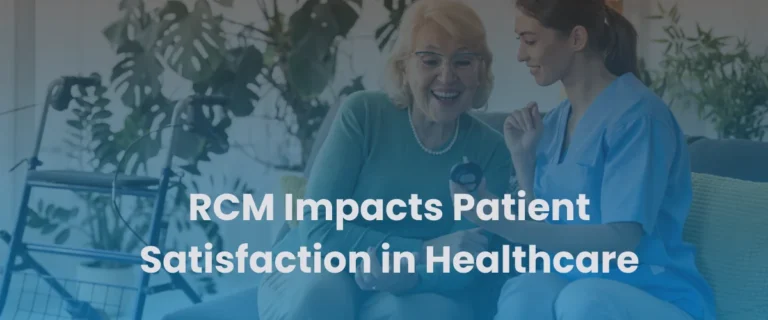Revenue Cycle Management (RCM) plays a pivotal role in the healthcare industry, bridging the gap between patient care and financial health. By ensuring seamless financial transactions, RCM allows healthcare providers to focus on delivering quality care without being bogged down by administrative and billing challenges.
An exploration of the concept of revenue cycle management, its importance in healthcare, and how adopting an effective revenue cycle management (RCM) solution can revolutionize a provider’s operations and financial outcomes is detailed in the upcoming sections.
Understanding Revenue Cycle Management (RCM) in Healthcare
Revenue Cycle Management (RCM) refers to the financial process that healthcare providers use to track patient care episodes from registration and appointment scheduling to the final payment of a balance. Essentially, it manages the entire lifecycle of a patient’s interaction with a healthcare provider, ensuring the organization is reimbursed appropriately for its services.
An effective RCM solution encompasses various stages, such as:
1. Patient Registration and Eligibility Verification
The RCM process begins when a patient schedules an appointment. At this stage, essential information is collected, including demographic details, insurance information, and eligibility verification to ensure coverage. Incorrect or missing data at this stage can lead to claim denials or delays, making it a critical component of the process.
2. Charge Capture and Medical Coding
Once care is delivered, the next step involves capturing the charges for the services provided. Accurate medical coding is crucial here, as it translates diagnoses, treatments, and procedures into standardized codes. Errors in coding can result in rejected claims or even compliance issues, which is why expertise in this area is vital for a smooth revenue cycle.
3. Claims Submission and Denial Management
Submitting claims to insurance companies is a central aspect of revenue cycle management (RCM). Even with careful preparation, some claims may be denied due to coding errors, missing documentation, or payer-specific policies. Denial management is an integral part of an RCM solution, helping providers identify issues and resubmit claims efficiently to avoid revenue loss.
4. Payment Posting and Patient Billing
When payments from insurance companies are received, they must be accurately recorded to reflect outstanding balances. If a balance remains, the RCM solution generates clear and timely bills for patients, facilitating the collection process. Transparency in billing enhances patient trust and ensures smoother payment processes.
5. Reporting and Analytics
The final stage involves analyzing the performance of the revenue cycle. Actionable insights derived from data help providers monitor key performance indicators (KPIs), such as first pass resolution rate, days in accounts receivable (A/R), and net collection rate. This enables organizations to identify inefficiencies and implement improvements.
Why Revenue Cycle Management (RCM) is Essential in Healthcare
Healthcare organizations face unique challenges, from evolving payer regulations to rising operational costs. Without a comprehensive revenue cycle management (RCM) solution, these challenges can lead to:
- Revenue Loss
Errors in claims submission or coding inaccuracies can result in denied claims, causing significant financial strain. For example, a slight drop in the net collection rate can lead to thousands of dollars in lost revenue every month.
- Regulatory Non-Compliance
Healthcare providers must adhere to strict billing guidelines set by payers and regulators. Non-compliance not only results in financial penalties but also damages the organization’s reputation.
- Administrative Overload
Manual processes slow down operations, increase costs, and raise the likelihood of human error. Administrative staff may find themselves overwhelmed with repetitive tasks, leading to inefficiencies and burnout.
By implementing a powerful RCM solution, providers can optimize their revenue cycles, enhance cash flow, and focus on patient care without being overwhelmed by financial concerns.
How Revenue Cycle Management Solutions Address Challenges
A revenue cycle management (RCM) solution is a technology-driven platform designed to streamline and automate financial processes within healthcare organizations. Here’s how these solutions address common challenges:
- Enhanced Accuracy
Automated systems reduce manual errors in billing and coding, ensuring claims are clean and ready for submission. For example, an RCM solution can identify missing patient details or mismatched insurance information before claim submission, minimizing denials.
- Improved Efficiency
RCM solutions automate repetitive tasks like patient eligibility checks, claims tracking, and denial follow-ups. This efficiency frees up administrative staff to focus on patient-facing activities, enhancing overall service delivery.
- Real-Time Monitoring
Modern RCM systems include dashboards and analytics tools, allowing healthcare organizations to monitor KPIs in real time. This enables quick adjustments to processes and minimizes disruptions.
- Faster Payment Cycles
By addressing claim denials swiftly and ensuring accurate submissions, RCM systems expedite reimbursements, improving cash flow. Faster payment cycles also reduce the financial burden on practices, allowing them to reinvest in patient care.
- Regulatory Compliance
RCM solutions help organizations stay updated with changing healthcare regulations, reducing the risk of fines or penalties. Compliance features ensure that billing practices adhere to payer-specific requirements and federal regulations, such as HIPAA.
Key Benefits of Revenue Cycle Management (RCM) Solutions
Adopting an advanced RCM solution provides healthcare organizations with:
- Increased Revenue
Minimized claim denials and maximized reimbursements ensure consistent cash flow. An optimized revenue cycle means providers can capture all the revenue they are entitled to without delays or losses.
- Operational Efficiency
Automation reduces administrative workload, enabling staff to focus on patient care and other high-value tasks. This creates a more productive and less stressful work environment.
- Patient Satisfaction
Transparent billing processes and faster resolutions contribute to a positive patient experience. Patients appreciate clarity in their financial obligations, which fosters trust and long-term loyalty.
- Scalability
Modern RCM solutions are designed to grow with your organization. Whether you’re running a small practice or a large healthcare network, these solutions can adapt to your needs and accommodate expansion.
- Actionable Insights
Analytics and reporting capabilities help providers identify trends, such as recurring denial reasons or payer inefficiencies. This data empowers organizations to make informed decisions and drive continuous improvement.
Choosing AtMedBilling as a Right Revenue Cycle Management (RCM) Solution
Selecting the right RCM solution is critical for achieving optimal results. When evaluating options, healthcare organizations should consider:
- Customization: Can the solution be tailored to the specific needs of your practice or specialty?
- Integration: Does the RCM system integrate seamlessly with your electronic health records (EHR) system?
- Scalability: Will the solution grow with your organization?
- Support: Is technical support available 24/7 to address issues promptly?
- Compliance: Does the solution comply with HIPAA and other regulatory standards?
Providers should also seek demonstrations and references to ensure the RCM solution aligns with their operational goals.
The Future of Revenue Cycle Management in Healthcare
The healthcare landscape is constantly evolving, with new technologies, policies, and patient expectations shaping the future. Revenue cycle management (RCM) solutions are becoming increasingly sophisticated, incorporating artificial intelligence (AI) and machine learning (ML) to enhance efficiency further.
- Predictive Analytics
Advanced RCM systems use predictive analytics to forecast trends, such as patient payment behaviors or claim denial probabilities. This proactive approach helps providers mitigate risks and optimize processes.
- AI-Powered Automation
Tasks like eligibility verification, claim scrubbing, and patient communications can be handled by AI, reducing manual workload and improving accuracy.
- Patient-Centric Features
Future RCM solutions will prioritize patient engagement, offering user-friendly portals for payments, inquiries, and appointment scheduling. These features enhance the patient experience while streamlining operations.
Conclusion
Revenue Cycle Management (RCM) is more than a financial process, it’s the backbone of a healthcare organization’s success. By adopting a robust revenue cycle management (RCM) solution, providers can overcome challenges, maximize revenue, and deliver exceptional patient care.
Investing in the right RCM solution is no longer optional; it’s essential for navigating the complexities of modern healthcare and achieving sustainable growth. With a strong revenue cycle in place, healthcare providers can confidently face the future, focusing on their primary mission: improving patient outcomes.




